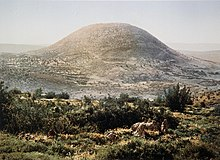Yes. This prophecy refers to the time immediately after the Israelites entered Canaan. Travel was not yet safe so people were allowed to sacrifice locally until the land was pacified. In fact sacrifices were allowed throughout Israel until the establishment of the Temple of Jerusalem, and even for a time after that in some cases. This seems to contradict Deut. 12:5-6 but a close reading shows that the ban against sacrifices outside of Jerusalem does not apply until after the land has been completely conquered, which did not take place until the time of King David.
10 But when you go over the Jordan, and live in the land which the
Lord your God gives you to inherit, and when he gives you rest from
all your enemies round about, so that you live in safety, 11 then to
the place which the Lord your God will choose, to make his name dwell
there, thither you shall bring all that I command you: your burnt
offerings and your sacrifices, your tithes and the offering that you
present, and all your votive offerings which you vow to the Lord.
We know from the Book of Judges that there were sill powerful enemies controlling parts the land, including trade pilgrimage routes. It would take centuries before Israel had established itself securely as a nation. The text implies that, since travel was still unsafe, local sacrifices were acceptable. Sacrifices were offered at the high places of Gibeon, Gilgal, Beth-el, Beersheba, Ramah, Nob and others. The Book of Kings emphasizes the importance of Gibeon, as Solomon sponsored large scale sacrifices there, follow by God's appearance to him:
1 Kings 2
4 And the king went to Gibeon to sacrifice there, for that was the
great high place; Solomon used to offer a thousand burnt offerings
upon that altar. 5 At Gibeon the Lord appeared to Solomon in a dream
by night; and God said, “Ask what I shall give you.”

Regarding high places in the land of Zebulun mentioned in the OP, the most likely location is Mount Tabor, pictured above in the 19th c. It overlooked the conjunction of the lands Zebulun, Issachar and Naphtali. It is also the traditional location of the Mount of Transfiguration, Peter hoped to establish memorials for Jesus, Moses and Elijah. (Mt. 17:4)
Since Levites were trained as priests and were assigned to serve local populations throughout the land of Israel, it is likely that they supervised most sacrifices at the various high places. The Bible also mentions several other men who conducted sacrifices at such altars, notably Samuel (Ramah) and Elijah (Mt. Carmel).
NOTE: The date of Deuteronomy is disputed. Scholars often date it to the time of King Josiah, in which case its policy served to centralize worship in Jerusalem -- a requirement which is not recorded in the other books of the Torah.
